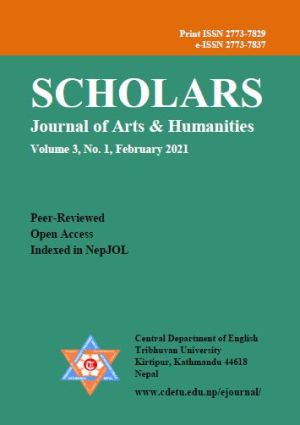Genetic Engineering, Globalization and the Future of Ecology: An Ecocritical Study of Margaret Atwood’s The Year of the Flood
DOI:
https://doi.org/10.3126/sjah.v3i1.35377Keywords:
Genetic engineering, globalization, ecocriticism, bio-imperialism, biodiversity, bioethicsAbstract
Applying ecocritical perspectives, this study examines and analyzes the impacts of genetic engineering under the dominance of corporate organizations in the era of globalization in Margaret Atwood’s fiction The Year of the Flood. The intrusion of genetic engineering in the age of globalization has been problematic because of the anthropocentric values of the corporate houses. In this context, this study argues that genetic engineering technology, if goes uncontrolled, is manipulated for corporate profit only, and raises serious risks to global biodiversity by promoting monoculture flora and fauna. Similarly, the study proves that the intense profit-making desire of the corporate world leads to global pandemic threatening the existence of natural organisms including humans. Members of the ‘God’s Gardeners’ in The Year of the Flood prepare themselves to be safe from the ‘Waterless Flood,’ a global pandemic that has been the result of uncontrolled experimentation of genetic engineering on food, animals and drug for corporate houses. The text, however, offers the possibilities of saving lives if genetic engineering is used from humanitarian perspectives. This research helps in understanding the role of economic activities in disturbing the global biodiversity. For the purpose of textual analysis, the study applies ecocritical perspectives of Vandana Shiva, Jeffery M. Smith, Claire Hope Cummings, and others with especial focus on “bioimperialism” as discussed by Shiva.
Downloads
Downloads
Published
How to Cite
Issue
Section
License
© Central Department of English, Tribhuvan University and Authors




